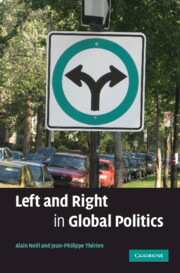Book contents
- Frontmatter
- Contents
- List of tables
- List of figures
- Acknowledgements
- Introduction
- 1 A clash over equality
- 2 A worldwide value divide
- 3 Two tales of globalization
- 4 The rise of the modern state system (1776–1945)
- 5 The age of universality (1945–1980)
- 6 The triumph of market democracy (1980–2007)
- 7 Twenty-first-century rapprochement
- 8 The core currency of political exchange
- Conclusion
- Index
- References
3 - Two tales of globalization
Published online by Cambridge University Press: 05 September 2012
- Frontmatter
- Contents
- List of tables
- List of figures
- Acknowledgements
- Introduction
- 1 A clash over equality
- 2 A worldwide value divide
- 3 Two tales of globalization
- 4 The rise of the modern state system (1776–1945)
- 5 The age of universality (1945–1980)
- 6 The triumph of market democracy (1980–2007)
- 7 Twenty-first-century rapprochement
- 8 The core currency of political exchange
- Conclusion
- Index
- References
Summary
It was the best of times, it was the worst of times, it was the age of wisdom, it was the age of foolishness, it was the epoch of belief, it was the epoch of incredulity, it was the season of Light, it was the season of Darkness, it was the spring of hope, it was the winter of despair, we had everything before us, we had nothing before us, we were all going direct to Heaven, we were all going direct the other way
Charles Dickens, A Tale of Two Cities, 1859)To say that the world is more and more complex is today considered conventional wisdom. Three overarching factors justify this almost universal perception. First, the communications technology revolution has fostered a formidable compression of space and time. Second, globalization has brought about an unprecedented increase in economic, political, social, and cultural interaction among populations of all regions and countries. Finally, the international scene, which was traditionally dominated by sovereign states, now has to adapt to the rise of new actors, both collective (including international institutions, sub-state governments, transnational corporations, and non-governmental organizations) and individual (including migrants, refugees, tourists, and terrorists). The fundamental changes underway in global politics have quite naturally engendered a vast diversity of reactions among experts. Far from being altogether cacophonic, however, these multiple viewpoints can well be understood as the expression of a coherent dialogue.
- Type
- Chapter
- Information
- Left and Right in Global Politics , pp. 56 - 82Publisher: Cambridge University PressPrint publication year: 2008

